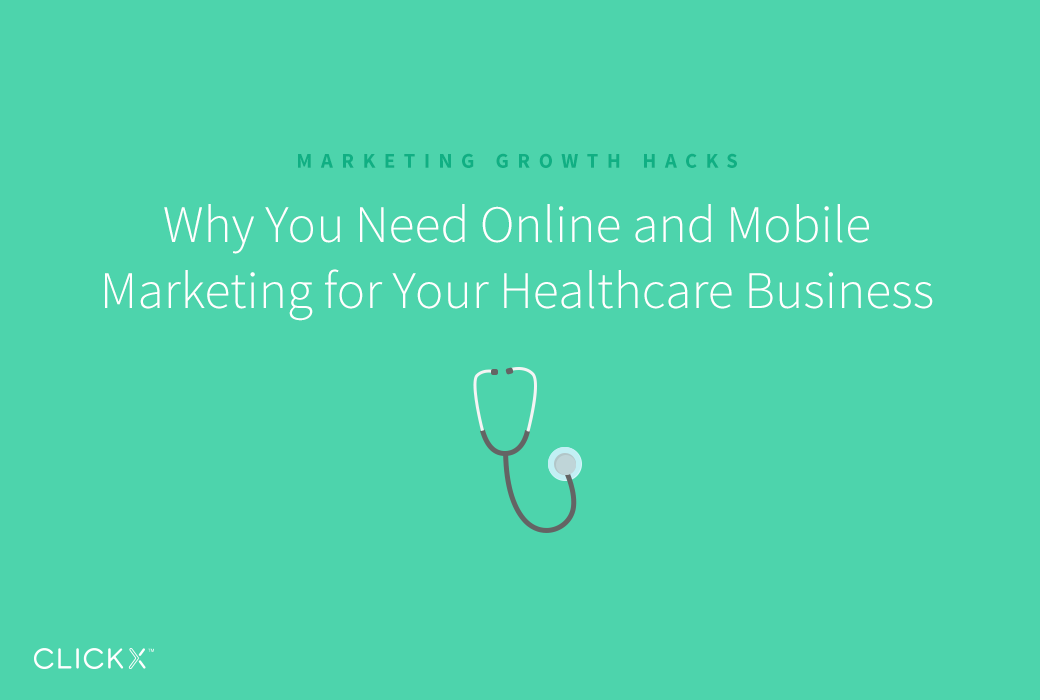Why You Need Online and Mobile Marketing for Your Healthcare Business
If you’re a doctor running your own practice, an emergency health clinic, a specialist, a hospital director, or you’re involved in any way in the healthcare industry, you may not think that online marketing and mobile advertising are terribly necessary for your success. After all, people are always going to get sick, break bones, look for dieting help, and need prescriptions, right? While that part is true, the fact is that most people look for healthcare solutions online, and if you’re not participating in ways that will allow them to find you and your business, the harsh truth is they’ll simply go somewhere else.
In a Google Partners presentation speaking to this issue specifically, we learned that nowadays, 1 in 20 searches online are health related. One in 20! When you consider just how many searches people do online everyday, that’s an astronomical portion of searches dedicated to one subject. If you’re not spending any time on marketing yourself online, you’re losing out on so much potential traffic and business that it would be near impossible to quantify it. To reach the customers that you’re after, you need to work on things like mobile advertising, local SEO, and other ways to attract viewers.
If it seems like this happened overnight, you’re not entirely incorrect. Just five years ago, in 2011, people spent twice as much time as they do now watching TV. Now, that time is spent online, on their computers or mobile devices. To better prepare you for what’s now required of you, let’s learn some more about the shift in the way people are looking for and learning about healthcare solutions as well as their own personal health.
More and More, People Consult the Internet First for Healthcare Issues
Nowadays, if people have a few symptoms, before they call a doctor or go to a drugstore for medicine, they’ll check sites like WebMD to find out if the health problem merits a visit to the doctor’s office. In fact, 43 percent of people go to the Internet for health queries first, and that number is rising rapidly. It’s gone up roughly 7 percent each year, so as time goes on, even more people will go to the internet for their initial research or questions.
What Are People Searching and How Do They Narrow Down Their Research?
Now that you know that 5 percent of all Internet searches have to do with health-related topics, it’s beneficial to learn about what sort of subjects people are looking to learn about. There are 156 million people online in need of a health solution, and there are 20 different search paths that make up roughly 65 percent of all consumer searches related to healthcare. If you’re not marketing online at all for your healthcare services or business, you could be missing out on a lot of traffic. Ninety percent of searches start out as non-branded searches—things like a symptom causing a problem, where to get help, certain types of products (such as vitamins), etc. Before, the process for learning about a health issue started with a stimulus—the problem arising/a person getting sick or injured—and continued to what is called the First Moment of Truth (FMOT). The FMOT was the step during which people would get a recommendation from a friend or loved one about what to do. From there, they’d make a choice about how to proceed.
Now, however, we have what is called the Zero Moment of Truth. After there’s a stimulus, instead of calling someone up for a personal recommendation, people will head to their computers or mobile devices for a recommendation. Additionally, instead of a “recommendation,” they look for answers and advice. Their searching is a springboard toward what they’ll do next.
So What DO They Do Next?
With 80 percent of people searching for healthier lifestyle information at some time or another, it’s up to you to find the best ways to capitalize on that. For instance, the importance of using online video marketing is huge. People want to look up first the health benefit overview of something, then the product information (if they’re researching a product, and finally, a consumer review of what they’re considering buying. Creating video content about things that your patients or customers are searching for can encourage longer site visits and a higher conversion rate, whether that means buying your product or booking an appointment.
According to Google, people searching health issues need to peruse 15.3 resources before they take any real action, like booking a doctor appointment. Those resources could be text-based pages, video content, advertisements with photos, customer testimonials, or other marketing materials. As people move closer to buying a product. Remember, 90 percent of searches about health issues start out non-branded—their searches begin to slant more toward branded searching—about ten to 16 percent of searches, to be precise. By the time people are ready to make a purchase, 48 percent of them have started using branded searching.
In other words, you need to promote your business or brand in such a way that your potential clients will know how to search for you. Including branding in your marketing content is, of course, one step, but you’ll also want to diversify the way you market yourself. Posting retargeting ads, display adds, pay-per-click ads, and more are all ways to effectively promote your business. While some medical professionals may see this as more relevant to consumer-facing industries, online marketing for the healthcare industry may present a huge opportunity for business growth.
[Tweet “Did you know that 1 in 20 searches are #health related? http://clickxstag23.wpengine.com/mobile-marketing-for-healthcare/ via @clickxio“]
How Are People Doing All These Searches?
Okay, so people are online, and that’s where they’re trying to find information. We know that much. As for where or how they’re doing it, that’s another thing you’ll have to optimize your marketing materials for. For example, 61 percent of people, even when they’re at home near their regular computers, will use their mobile devices to search for health-related content. Whether privacy issues, convenience, or other factors play into this is mostly irrelevant—the takeaway is that your marketing and website need to be fully functional on mobile devices.
Responsive design is no longer a nice thing to have—it’s absolutely essential if you want people to stick around. Still not convinced? This might sway you: 77 percent of people will leave a site if it is not optimized for mobile viewing and use. Your mobile navigation needs to be fully functional, well designed, and easy to use. Make sure to get second opinions before pushing your mobile site live, too—ask questions and take the feedback. Is it smooth and fast to load? Is it easy and secure to enter information?
These questions are what your potential patients and visitors will be asking themselves before they either leave your site or schedule an appointment, so it’s absolutely in your best interest to make sure your mobile site is up to speed—literally and figuratively—so that you don’t lose out.
Is It Really Necessary to Market Yourself Online, Though?
If you’re still not sold on the idea of creating well-planned marketing strategies online, it’s time for some cold, hard statistics:
- Out of a whopping $10.9 billion ad spend budget in the healthcare industries, more than 14 percent is spent on digital.
- Of the searches looking for behavioral health solutions, 52 percent—more than half of all searches!– make decisions on who to see based on their Internet research.
- Hospital websites see 70 percent of their total traffic from search engine queries—nearly three-quarters of all of their traffic comes from Internet searches.
- 60 percent of people will validate a doctor’s information on the Internet. Whether that’s advice about quitting smoking, a recommended prescription, or virtually any other information, these people will get a “second opinion” online.
- Two-thirds of emergency room visitors found the hospital by doing a search on the Internet. Seem high? It’s because, unfortunately, not every emergency happens when people are at home. Whether it’s on vacation, during the aftermath of a car accident.
The shift in the way media is consumed these days has influenced the way people market their businesses and products in a significant way. Newspaper ad revenue is down, and the use of local TV, billboard, direct mail, and Yellow Pages ads is much less prevalent. It now takes a total of nine ads to reach the same audience that, 20 years ago, would have only taken one ad on television. That’s because more people do things like DVR their favorite programs and skip the ads, or stream content online.
But even though ad revenue is down and there are different methods to the madness that is marketing, the demand is still there. Four out of five people want healthier lifestyles, according to Google, and when you think of devices that give people constant updates about their statuses—things like Fitbit, Jawbone, and smart watches like Apple Watch’s Health app—there’s a clear market for healthcare and health solution advertising.
It’s not just about attracting new patients—if you’re a doctor’s office, sure, that’s part of what your marketing will do, but you can also present yourself as a thought leader in the industry, posting helpful information that people are looking for all over the Web. People turn to one-click buying for many health-related products, as well. Once they’re interested in a product, they move quickly, so it’s to your benefit to utilize all marketing tactics you can in order to draw in a larger audience.
What Do You Have to Do?
Now you have all the information you need to know that online marketing is something you need to be doing for your business, product, practice, or other service. But all the data in the world can’t help you unless you have a great strategy and a plan to follow up with it.
Clickx is an all-inclusive software that gives you a birds-eye view to all of your marketing efforts. Our experts are your partners, and we want to help you succeed. When you use the Clickx software and solutions, you’ll learn more about products and services that help boost your organizations visibility, such as:
-
Bold Local
Bold Local is a tool that ensures local SEO—a combination of different search strategies that ensure the right kind of customer finds your page—is implemented on your website. Local SEO targets audiences in the right areas that matter to your business the most—not users that are states away during their searches. After all, a lot of health-related searches include the phrase “near me”—you’re the business near them, so it’s important they can find you.
-
Forth Social
Forth Social is the tool on Clickx that shows you how effective your social media profiles are. It’s more complex than simply putting your organization’s name at the top of the page and updating it once a month. Forth Social manages your social accounts (such as Twitter, Facebook, and Google+ pages) and ensures that customer outreach, promotions, marketing, and more is all handled. Contact us anytime to learn more about Forth Social package pricing and how it can optimize your social presence.
-
Adex
Adex is a tool you can use to grow your retargeting and display ad campaigns. You get it started, and the tool monitors its results and progress. PPC ads, Google Product Ads, and more are all broken down into easy-to-understand reports that can help you tweak the strategy for maximum ROI. These ads and information can increase the likelihood of getting well-qualified leads, which are the leads that are more likely to turn into customers. Adex also includes social media ads, call tracking, landing page design, ProRetargeting (display ads on related sites that incorporate user-specific behavioral targeting, so the visitors you get are ones who really want to be there), and more.
-
PromoteSearch
PromoteSearch technology solutions help find things that could be causing your website to underperform. The five phases of PromoteSearch are:
- Define your goals, which will be used to drive more valuable traffic to your site.
- Develop a strategy to meet those specific goals, including monitoring of linking structure, site design, metadata, and much more.
- Optimize the onsite content and continuously update this, as it improves your visibility online and creates a more user-friendly experience for the visitors.
- Implement the use of “evergreen blogs”—content that is not time-specific and will always be relevant—and content marketing, which keeps relevant content at the forefront of your marketing venture.
- Finally, follow analytics and reports. Here is where data is analyzed and tracked, where search engine algorithms are catered to, and where your website continues performing highly.
Want to learn more about Clickx and how it can benefit your business? Here, we’re a Google Certified Partner, and we’re ready to expertly manage your ad, marketing, and PPC campaigns—to get started, request a grading of your website using Clickx’s grader, or contact us anytime to learn more about our services that help you attract more traffic, engage visitors, and convert more customers.










